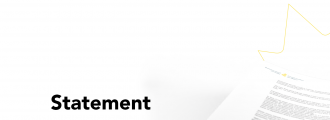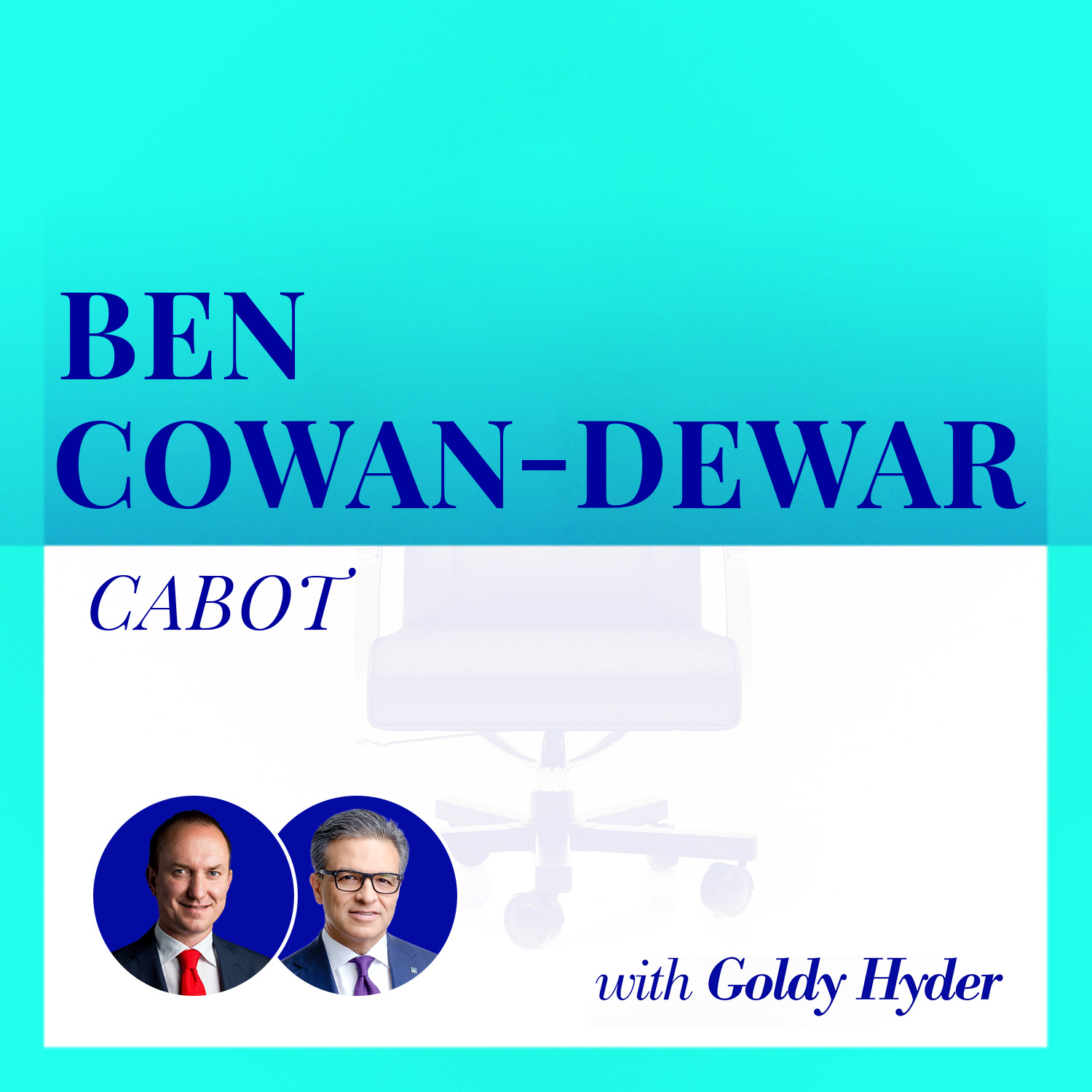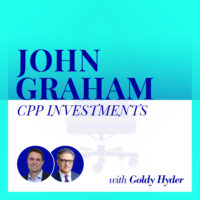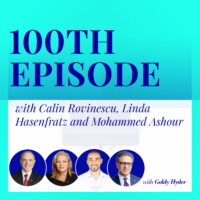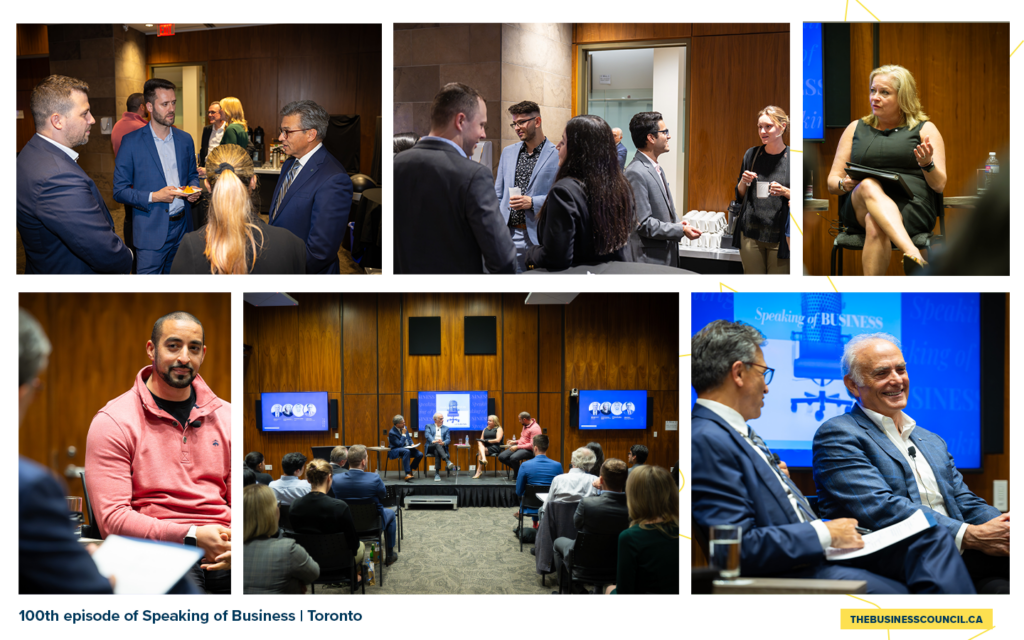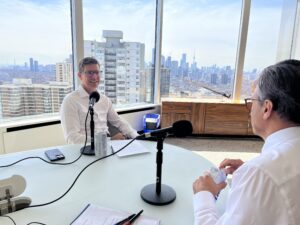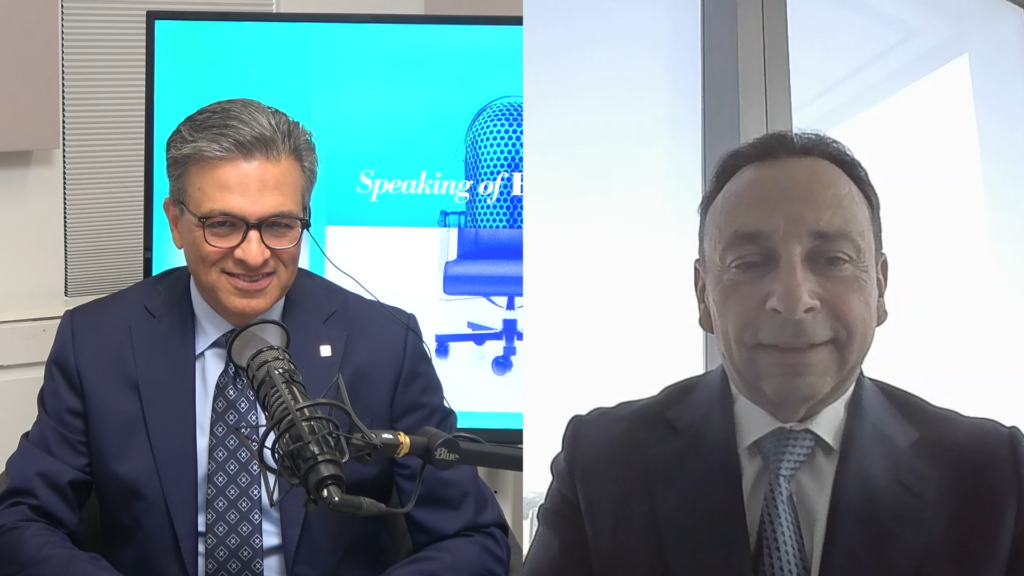At the age of 24, Ben Cowan-Dewar set out to build a golf course in a remote part of Cape Breton. Construction began around the time of the 2008 financial crisis. Did he think it was a risky venture? “In hindsight,” he says, “obviously it was.”
But it paid off. Now, Cowan-Dewar’s Cabot Cape Breton golf courses are ranked among the best in the world and the company is expanding, building new courses and resorts in Revelstoke, B.C. and Saint Lucia.
In a conversation with Goldy Hyder in the Speaking of Business podcast, Cowan-Dewar credits part of his success as a young entrepreneur to the advice and support he received from experienced business people. “I would watch these great Canadians in their 60s, 70s and 80s take a really long view and I thought ‘well it’s easy for them, they’ve already been successful.’ But what you realize is, it’s easy for them because they’ve been through cycles.”
Learning how to take a long view and adapt to economic cycles helped Cowan-Dewar, co-founder and CEO of Cabot, weather the COVID-19 pandemic – a crisis that had a devastating impact on Canada’s tourism sector, including the golf industry.
Now he’s sharing what he’s learned with younger entrepreneurs. His advice? – keep a level head, use problem solving skills, and remember “you have people who are really cheering for your success.”
Listen to Ben Cowan-Dewar’s full conversation with Goldy Hyder.
Ben Cowan-Dewar:
The stories of risk, particularly when you’re young, they seem cataclysmic and then you have many, many, many cycles of risk. Those things, building through them, persevering through them, helps set you up for the next one.
Goldy Hyder:
Welcome to Speaking of Business, conversations with Canadian innovators, entrepreneurs, and business leaders. I’m Goldy Hyder, President and CEO of the Business Council of Canada.
Goldy Hyder:
When Ben Cowan-Dewar was 24 years old, he embarked on an ambitious and risky project to convert a former Cape Breton mining site into a world class golf resort. There were lots of obstacles in his way, not the least of which was starting construction at the beginning of the 2008 financial crisis. Today, Cabot Cape Breton’s golf courses are ranked amongst the top in the world.
Goldy Hyder:
Ben is expanding. He’s opening a new golf resort in St. Lucia next year, and he’s working on another in Revelstoke, B.C. As Canada’s economy starts to recover from the COVID-19 pandemic, I wanted to speak with Ben about his journey.
Goldy Hyder:
This year on the podcast we’re discussing economic growth, so I wanted to know what are the lessons he’s learned about ambition and risk that others can learn from? Let’s find out.
Goldy Hyder:
Welcome Ben.
Ben Cowan-Dewar:
Hi Goldy. How are you?
Goldy Hyder:
I’m doing well. It’s really good to see you and thank you for making the time. Let’s jump right into it. Let’s talk about ambition, where I just left off the introduction. You’re 24-years old. You’ve never designed a golf course before. What made you think you could actually do this?
Ben Cowan-Dewar:
There was a great line by a Nova Scotia writer, John DeMont, and I know I didn’t say it because it was such an eloquent quote, he paraphrased it as, “I didn’t think I couldn’t do it, more than I thought I could.” I’d played most of the world’s great golf courses by then. I’d started a business out of the University of Toronto while I was a student. That had given me a real global perspective on great golf.
Ben Cowan-Dewar:
While I’d never designed, and I’d never developed, I’d never worked in a restaurant, I’d never worked in a hotel or a golf course, and I’d certainly never built a building, I had the enduring belief that we had one of the most spectacular pieces of property in the world, and that we could find, and we needed to find, a lot of great people to help us achieve a big dream.
Goldy Hyder:
So, a bit of audacity to it?
Ben Cowan-Dewar:
A little bit of audacity. A lot of youthful naivety, for sure.
Goldy Hyder:
That doesn’t hurt.
Ben Cowan-Dewar:
Yeah, it doesn’t hurt. When I meet young entrepreneurs, one of the things I remind them of is they have so little to lose. It seems like a lot at 24, but it’s a very different experience than when you have family and other responsibilities.
Goldy Hyder:
It’s safe to assume you’re a pretty good golfer, eh?
Ben Cowan-Dewar:
I was a pretty good golfer, and then we started building golf courses in far flung places.
Goldy Hyder:
Oh sure, use that excuse.
Ben Cowan-Dewar:
I still love the game.
Goldy Hyder:
That’s a new one.
Ben Cowan-Dewar:
I still love the game, and I think COVID has brought me back to it, like it has so many people, and then given the opportunity. As much as I love the game of golf, I always really loved golf courses, and particularly great ones. I loved the camaraderie, and if I’d been in widgets, I would’ve met a lot fewer people than I was in golf. Many aspects of the game I love, but certainly golf courses were always one of the things that really shone through.
Goldy Hyder:
Well, we’ll certainly come back to some of what you just said, particularly about COVID, but let’s stay on the theme of ambition, and audacity, and risk taking. It really sounds improbable that you wanted to attract golfers from around the world to a mining town that’s being converted into a golf course. It’s very, very remote, an extremely remote part of Canada.
Goldy Hyder:
What lessons would you have learned, in terms of risk taking, because it all sounds so risky.
Ben Cowan-Dewar:
Well, and again, in hindsight Goldy, obviously it was. Again at 24, to borrow Dean Connor’s line of, “He can close his eyes and see something in technicolour,” I could see the golf course in technicolour, and I don’t think I was focused on the second golf course, or the hospitality, and the fact that we would need to, and eventually, employ hundreds of people.
Ben Cowan-Dewar:
I was really focused on the singular thing. When people talk about vision, a lot of that can be incremental. It’s easy to look back on something, and obviously 17 years later we’ve had a lot of success in Cape Breton, and given ourselves a platform to grow globally. The reality is, we had to start somewhere, right? It was the first golf course at Cabot Links was modest in its overall scale of investment compared to what we’ve done all these years later. It was the first bite of the elephant we had to take, and that was the focus.
Ben Cowan-Dewar:
Now that it looks like a foregone conclusion, we really were starting relatively small, and building incrementally, and building on that success.
Goldy Hyder:
Safe to say that one has a special place in your heart?
Ben Cowan-Dewar:
Yeah, for sure. I remember being with a great golf course architect who was a Canadian, Geoff Cornish, who’d been a part of building Capilano and Highlands Links in Cape Breton, and I’d been with him… He was around 90 at that point in 2002.
Goldy Hyder:
It’s about what I shoot. So it’s a good number.
Ben Cowan-Dewar:
Exactly. I said to him, “Geoff, what’s your favorite golf course?” He said, “Well, it’s a lot like your children, you can’t really pick one.” I remember thinking it was just the lamest answer. I was in my early twenties at the time. But now that we’ve been able to do a few of them, they all have a special place in your heart.
Ben Cowan-Dewar:
The first course at Cabot Links, and watching it come out of the ground, and really against all odds, because you talk about risk, the risk of the initial idea, and the risk of pursuing it, and the risk of betting everything I had to do it, felt mitigated when I found the most amazing partner and friend to back me, who had really done this, Goldy.
Ben Cowan-Dewar:
Mike Keiser had built Bandon Dunes in Oregon, and backed a young Canadian who had never done any of it, and really gave me a chance. Then we ran into the financial crisis, and I’d moved from downtown Toronto with my wife, to Inverness, Nova Scotia, who was very pregnant with our first child. Then the financial crisis, basically, was a depression for golf course construction.
Ben Cowan-Dewar:
The stories of risk, particularly when you’re young, they seem cataclysmic, and then you have many, many, many cycles of risk. Those things, building through them, persevering through them, helps set you up for the next one.
Goldy Hyder:
You might have some explaining to do at home. That sure sounded like you liked your first born better there. Let me move on to Anne McLellan and Lisa Raitt, who were on our podcast just earlier this month. They’re talking about Canada’s post-economic transition.
Goldy Hyder:
I want to play a clip for you from Lisa Raitt, also a Cape Bretoner, as you well know. This is her thoughts on Cape Breton. Let’s play the clip.
Lisa Raitt:
Cape Breton is a really good example of what happens when you don’t have a master plan, and you’re transitioning your economy, and I lived it through the ’70s and ’80s. Anne knows full well what it was like, because she was a cabinet minister during the time, trying to deal with some serious economic issues in a part of the world where a plan would’ve been helpful.
Goldy Hyder:
You have a very unique vantage point when it comes to reviving communities where jobs have been lost. How challenging is it to bring new industry and investment into an economy that is, in the words of Lisa Raitt, transitioning.
Ben Cowan-Dewar:
Well, Lisa was talking about the ’70s and the ’80s, and obviously the loss of the loss of steel. If you think about Inverness, Inverness’s coal mine, which started mining in 1880, stopped in the ’50s in ’53. Probably even more acute, my wife’s family were from Cape Breton, which was part of the original lure, but it wasn’t how I found the site.
Ben Cowan-Dewar:
Her grandmother is still alive at 104 in Glace Bay, and I remember when we said we were doing the project in Inverness, Grammy said, “No one goes to Inverness,” and she was a Cape Bretoner living in Glace Bay, and really it was true. People had driven around the town of Inverness, had been to Cape Breton many times as tourists. Inverness was even probably more acutely impacted, and for a much longer time. Their industry had left more than 50 years before I walked into the town of Inverness for the first time, in December of ’04.
Ben Cowan-Dewar:
It was a brutal transition which really hadn’t taken hold 50 years later when we got there. Unemployment was still really high, and it was really the vision of the town fathers, because it was a group of men who had really fostered this dream of a golf course on this site that had been a mine site.
Ben Cowan-Dewar:
The first meeting on turning this site into golf predated me, it was in 1969, they had a meeting. They had a dream, they had an idea, but it was an awfully tough road.
Goldy Hyder:
I must say, I remember going out to New Waterford, Nova Scotia back in grade 12, playing the Coal Bowl, and it was the first trip out east for me. You are so reflective of the people of that region. They’re just the nicest people you can meet in Canada, so I’m happy for your success now.
Goldy Hyder:
Your success, as you noted, came with a lot of obstacles in the way. You were basically building Cabot Cape Breton during the 2008 downturn, as you referenced earlier. What were you able to learn that helped inform you, now that you’re managing the next big crisis of COVID?
Ben Cowan-Dewar:
Look, we could talk for an hour about the need for great mentors. One of the amazing things about being an entrepreneur in Canada is the support you get from great Canadians who are farther along the path. I’ve had way more than my fair share of that, including really the Atlantic Canadians.
Ben Cowan-Dewar:
I’ve grown up in rural Canada in Ontario, so I had a fondness for rural Canada and for rural Canadians, which really made moving to Inverness, not the most far flung idea in the world from downtown Toronto. When I watched, through the financial crisis… Again, I really felt like everything I’d worked for, for four years, and we hadn’t really opened anything, we just had gotten started, was at huge risk. I would watch these great Canadians in their sixties, seventies, and eighties take a really long view.
Ben Cowan-Dewar:
I thought, well, it’s easy for them, they’ve already been successful. What you realize, is it’s easy for them because they’ve been through cycles. I watched from a couple of posts; from my role at Cabot and obviously chairing Destination Canada, the Federal Crown and Tourism, through just an absolutely existential crisis for tourism that isn’t over. It’s still ongoing, and 18 months later, it’s still acute in many parts of the country.
Ben Cowan-Dewar:
It’ll change the face of the industry. At the same time, with that perspective, it’s a lot easier. When I talk to the younger entrepreneurs who, it’s their first crisis, you remember to keep a level head, and you have good problem-solving skills, and you have people who are really cheering for your success.
Ben Cowan-Dewar:
Those were the lessons from ’08 that we really needed to rely on, because COVID was absolutely an unbelievable risk, that if we had sat around for a weekend to come up with the greatest risk we could have faced as a business, we never would’ve come up with that.
Goldy Hyder:
You and I have had more than half a dozen conversations in those 18 months, and I haven’t heard you say that phrase, “change the face of the industry” that you just said. Tell me what you mean by that?
Ben Cowan-Dewar:
Well, we’ve seen decisions that have been made that will forcibly change. Ranging from, again, living and working in our home office in Toronto, I didn’t go to Nova Scotia in 2020.
Ben Cowan-Dewar:
There was a session this week with WestJet and the Halifax Airport. One of the WestJet executives said, “Look, the view from Alberta is that Nova Scotia is not welcoming.” He said, he thought Halifax had the biggest hole to climb out of, from an air traffic standpoint. It really is the regional hub for Atlantic Canada.
Ben Cowan-Dewar:
You think about what in the world could have happened, that I wouldn’t have gone to Nova Scotia, for the first time in 20 years? The regulation of inter-country travel, we’ve lost so much market share as a country, and our airlines in air access. In our business, we are incredibly dependent on, not just Canadians, but Americans and beyond.
Ben Cowan-Dewar:
Even the Canadians… Ontario is, by far, the largest market for us. Western Canada is a really good market; Quebec. Forced to operate a business without 90% of your market, with just an Atlantic bubble, that will have long lasting impacts.
Ben Cowan-Dewar:
The other piece is, because of those impacts, people who were lost from the workforce, I don’t think will come back. I don’t think we’ll see as many people. To deliver tourism, which is a sector that obviously is vital to the country’s economy, but one of the things that people don’t know is, it’s just so significant; an employer from coast, to coast, to coast.
Ben Cowan-Dewar:
It’s also the only way we market the country outside of the country. It’s the brand of the country. It’s how many first-time Canadians come to the country and are exposed to it. It’s how people form relationships that lead to investment, leisure routes create business travel linkages.
Ben Cowan-Dewar:
It’s importance, while undermined perhaps at the Department of Finance, due to its relatively low wages, is offset by the fact that it’s a ladder out of inequality in so many communities. It’s a first time job for so many people. The face of that employment base will be changed forever by it, and how we deliver will change too. It’ll have to.
Ben Cowan-Dewar:
We’ve seen wage inflation, people moving, and yet I think, for the rural destinations versus the city hotels, there’s probably more appeal to live in rural Canada than we’ve ever had before.
Goldy Hyder:
You mentioned your leadership at Destination Canada. What are you discussing around that board table in terms of the importance of tourism to Canada, for the reasons you cited. In some cases the relationships are people who meet and get married as a result of traveling here. Is it possible that we’re too reliant on tourism? Is that even a consideration?
Ben Cowan-Dewar:
No. Look, I chaired Destination Canada for over four years and my term ended earlier this year. I also represented tourism and hospitality on the economic strategy table, which I know you’re well aware of, even if most of your listeners wouldn’t have heard of it.
Ben Cowan-Dewar:
One of the things about tourism that I would say… I remember Dominic Barton having a lunch in Halifax, and giving a presentation at a conference, must have been in 2012, or ’13 maybe, maybe ’11. He had the seven economic drivers of Canada in the next century, and tourism was one of them.
Ben Cowan-Dewar:
I’ve long admired Dom, but I forged a relationship there because in a room of business executives, and bank executives, I said it was the first time I was invited to the adult table, from the kid table, at a business conference.
Ben Cowan-Dewar:
Literally people were looking at him and saying, “Tourism, really?” Even in Atlantic Canada, let alone Canada, this is something that we are truly world class at, that we have an unbelievably unique proposition that…
Goldy Hyder:
Oh, we’re great hosts.
Ben Cowan-Dewar:
Twenty years ago, we were in the top 10 destinations. We’re right now, still in the top five brands in the world for tourism. I would say, not too reliant at all, so it’s something that works in rural Canada, which we’ve seen. As someone who’s spent more than half of my life living in rural Canada, rural Canada has been like the rural world, hollowed out over the last 50 years. The things that made sense 50 years ago don’t make sense, but tourism still does.
Ben Cowan-Dewar:
It’s a great brand builder. It’s a great on-ramp to the workforce, and we’ve lost a lot of market share, and we’ve lost a lot of luster to the sector. We have a lot of rebuilding to do, to get back to realizing its potential.
Goldy Hyder:
Yeah. For many young people, it’s their first foray into the employment market. You’re absolutely right about that.
Goldy Hyder:
Look, we’ve covered a lot of ground there. You did say something that perhaps our listeners have not been seized, with the Industry Strategy Council work and the work of Monique Leroux and the group for which you are a member. It’s a federal government-commissioned report that was tabled late in 2020. It’s obviously not on top of mind for most Canadians, and I suspect many aren’t aware of it, but I would certainly encourage them to read it in detail.
Goldy Hyder:
From your perspective, give me a single takeaway that’s like, this is the most important thing coming out of this Industry Strategy Council, where you met with a thousand stakeholders, and you heard from people from all different walks of life. What did you learn? What was the one thing that you want us to all be aware of?
Ben Cowan-Dewar:
Well, I think that Canadians are amazingly interconnected, and yet whenever you talk to an industry group, there becomes this real focus on, almost like, a clan-like bias to, “Let me tell you why agriculture, or fisheries, or forestry, or mining, or financial services, or aerospace…”
Goldy Hyder:
Or tourism, for example.
Ben Cowan-Dewar:
Yeah, or tourism, or tourism, is the most important thing to Canada. What I really noticed as we talked to people, particularly in remote geographies, is the interconnectedness of all of this. So again, when you think about our airlines who have suffered brutally through the last 18 months, and their role of transporting people from the north to hospitals, their role of connecting grandparents in St. John’s to grandchildren in Fort McMurray, and that creating an air linkage that allows people to go back and forth to work, and support their family, that creates cargo routes for our products. One of the things that you’d really see, we had so many terrific members of the table, but transportation linkages, which were vitally important to agriculture in Saskatchewan, were vitally important to energy in Alberta, were vitally important to tourism through the Rockies.
Ben Cowan-Dewar:
There was a real awareness, as you touch so many parts of the economy, of how interlinked these things were versus thinking of them as silos that really didn’t have massive overlap. Again, tourism is a huge part of air travel, but connecting family members across a country where we’re unlikely to go back to rail travel as the primary mode in such a vast land, you realize those air linkages connect communities with food, services, goods, and our ability to sell our outbound services to the world, rely on that.
Ben Cowan-Dewar:
Really, that would’ve been my takeaway, Goldy. Not that I wouldn’t have thought that, or you wouldn’t have thought that, but it was just the resounding thing of how many people linked so many parts of the economy and to how connected they were, versus they were these silos competing for attention.
Goldy Hyder:
In some ways, we’ve covered off your origins. We’ve covered off your challenges, both with ’08 and COVID. Let’s look forward optimistically, if we can a little bit here.
Goldy Hyder:
A lot of this podcast has been about transition. As this country recovers from the pandemic, it seems rather evident that we’re going to need, not just different thinking, but creative thinking to help us grow, and recover, and exceed it. I want to know from your perspective, is there a big idea that you think could help transform Canada?
Ben Cowan-Dewar:
Well, I love big ideas. The big idea that I think would transform Canada is longer-term thinking, bigger dreams, and a desire to build things rather than sell.
Ben Cowan-Dewar:
When we think about Cabot, which was recognized two weeks ago by the USA Today as the number one, in 11 courses in the world. It was a far flung dream to build a golf course in Cape Breton, Nova Scotia. The reality was, if we did something that was truly world class, people from around the world would find it. Seventeen years in, and there’s so many wonderful Canadian entrepreneurs in their eighties who tell me I need younger friends, but who have built amazing businesses over 60-plus years. They’re my exemplars, and they have built amazing businesses that have gone both across the country, but certainly global, everybody had to go globally to compete at that scale.
Ben Cowan-Dewar:
For us, it’s given us a platform to be able to expand both in Canada and Revelstoke, British Columbia, but into the Caribbean, into the U.K., and into the U.S. We came up with a different model of a direct-to-consumer model. It’s not just a “dream big on the original idea”, it’s a “keep building on that dream”.
Ben Cowan-Dewar:
I joke with my team, although they know I’m not joking, that I think I’ve got a good 48 years left in me of doing this. If that’s your time horizon, and you’re looking global, I think that’s the thing that I love. When I look at the young Canadian entrepreneurs who I admire, they’re thinking the same way. There’s a lot of hope there.
Ben Cowan-Dewar:
In the short term on a smaller tourism big dream, focus on the U.S. The U.S. is a massive market. It was always our biggest market. We actually stopped marketing to the U.S. as a country a decade ago, which is crazy when you look at the tourism arrivals relative to the rest of the world combined. The U.S. market is back. The leisure market is back, and it’s a chance for our Canadian airlines to win market share into cities that maybe we hadn’t gone to as much before, in the southern U.S., who are looking to escape the heat of the summer. That’ll create business linkages, and trade linkages, and the chance to sell into the U.S. with better access.
Ben Cowan-Dewar:
One may be higher level, and one a bit more granular, but lots of opportunity for a wonderful country and wonderful people.
Goldy Hyder:
That’s a great place to stop, because it really is speaking to culture. It’s speaking to who we are as a people. Think big, dream, be ambitious, and build things.
Goldy Hyder:
Ben, thanks for showing us how it’s done, my friend.
Ben Cowan-Dewar:
Goldy, thank you so much.
Goldy Hyder:
I want to thank Ben Cowan-Dewar, co-founder and CEO of Cabot, for sharing his journey with us, for talking about his hopes for Canada, and how it is that we can recover from this crisis to help grow back our economy.
Goldy Hyder:
If you would like to hear more of our Speaking of Business conversations with innovators, leaders, and entrepreneurs, why not subscribe to our podcast? Search for Speaking of Business, wherever you get your podcasts, or simply go to our website at thebusinesscouncil.ca.
Goldy Hyder:
Until next time, I’m Goldy Hyder. Thank you for joining us.
